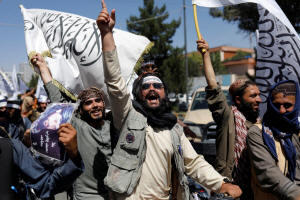Taliban mark two years since return to power in Afghanistan
 Send a link to a friend
Send a link to a friend
 [August 15, 2023]
By Mohammad Yunus Yawar and Charlotte Greenfield [August 15, 2023]
By Mohammad Yunus Yawar and Charlotte Greenfield
KABUL (Reuters) - Afghanistan's Taliban on Tuesday marked the second
anniversary of their return to power, celebrating their take-over of
Kabul and the establishment of what they said was security throughout
the country under an Islamic system.
After a lightning offensive as U.S.-led foreign forces were withdrawing
after 20 years of inconclusive war, the Taliban entered the capital on
Aug. 15, 2021, as the U.S.-backed president, Ashraf Ghani, fled and the
Afghan security forces, set up with years of Western support,
disintegrated.
"On the second anniversary of the conquest of Kabul, we would like to
congratulate the mujahid (holy warrior) nation of Afghanistan and ask
them to thank Almighty Allah for this great victory," the spokesman for
the Taliban, Zabihullah Mujahid, said in a statement.
Security was tight in the capital on Tuesday, which was declared a
holiday, with soldiers stepping up checks.
Taliban parades were expected through the day and several departments,
including the education ministry, held gatherings to celebrate.

"Now that overall security is ensured in the country, the entire
territory of the country is managed under a single leadership, an
Islamic system is in place and everything is explained from the angle of
sharia," Mujahid said.
Afghanistan is enjoying peace not seen in decades but the U.N. says
there have, nevertheless, been dozens of attacks on civilians, some
claimed by the Islamic State rivals of the Taliban.
For many women, who enjoyed extensive rights and freedoms during the two
decades of rule by Western-backed governments, their plight has become
dire since the return of the Taliban.
"It's been two years since the Taliban took over in Afghanistan. Two
years that upturned the lives of Afghan women and girls, their rights
and futures," Amina Mohammed, deputy secretary-general of the U.N., said
in a statement.
Mujahid made no mention of the contentious issue of female education in
his statement.
OBSTACLE TO RECOGNITION
Girls over the age of 12 have been mostly excluded from classes since
the Taliban returned to power. For many Western governments, the ban is
a major obstacle to any hope of formal recognition of the Taliban
administration.
[to top of second column]
|

Taliban members rejoice on the second
anniversary of the fall of Kabul on a street near the US embassy in
Kabul, Afghanistan, August 15, 2023. REUTERS/Ali Khara

The Taliban, who say they respect rights in line with their
interpretation of Islamic law, have also stopped most Afghan female
staff from working at aid agencies, closed beauty salons, barred
women from parks and curtailed travel for women in the absence of a
male guardian.
Journalism, which also blossomed in the two decades of rule by
Western-backed governments, has been significantly suppressed.
The detention of media workers and civil society activists,
including prominent education advocate Matiullah Wesa, have raised
the alarm of human rights groups.
The Taliban have not commented in detail on those issues but say
their law enforcement and intelligence agencies investigate
activities they consider suspicious to seek explanations.
On the positive side, the corruption that exploded as Western money
poured in for years after the Taliban were ousted in 2001, has been
reduced, according to the U.N. special representative.
There are also signs that a Taliban ban on narcotics cultivation has
dramatically reduced poppy production in what has for years been the
world's biggest source of opium.
The Taliban will be hoping the progress will help bring foreign
recognition and the lifting of sanctions, and the release of about
$7 billion in central bank assets frozen in the U.S. Federal Reserve
Bank of New York in 2021 after the Taliban took control, half of
which was later transferred to a Swiss Trust.

A fall-off in development aid has seen job opportunities and gross
domestic product shrink and the U.N. estimates more than two-thirds
of the population need humanitarian aid to survive.
(Reporting by Mohammad Yunus Yawar in Kabul and Charlotte Greenfield
in Islamabad; editing by Robert Birsel)
[© 2023 Thomson Reuters. All rights
reserved.]This material may not be published,
broadcast, rewritten or redistributed.
Thompson Reuters is solely responsible for this content. |